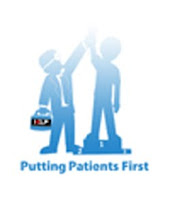Patient advocacy
From Wikipedia, the free encyclopedia
Patient advocacy is an area of lay specialization in health care concerned with patient education about the use of health plans and how to obtain needed care. Patient advocates include government consumer advocacy agencies, which provide services to the public at large, and private sector for-profit and non-profit service providers, which offer services to individual patients.
The patient advocate may be an individual or an organization. The terms patient advocate and patient advocacy can refer both to individual advocates providing services that organizations also provide, and to organizations whose functions extend to individual patients. There are also governmental agencies that study and ensure compliance with government regulations including financial aid. Some patient advocates work for the institutions that are directly responsible for the patient’s care.
The patient advocate may provide medical literature and research services to the patient, family, or health care provider. The patient advocate may also assist with family communication on issues arising from illness and injury. This may include further referral for care and support for both patients and families. The patient advocate has a responsibility for awareness of compliance, appropriateness, and coordination of care for the patient, such as oversight for potentially conflicting treatment modalities and medications. The patient advocate can ensure that questions about the appropriateness of treatment are promptly discussed with the patient's care provider, and that all treatments and concerns are promptly entered into the patient's health care record. The patient advocate is also responsible for reviewing the patient's health care record for correctness and explaining it to the patient. Creation and maintenance of an electronic log for the patient that is available on disk to health care providers is another responsibility of the patient advocate, which may be of great benefit in subsequent urgent situations.
The patient advocate can also assist in resolving disputes between patients and their health care provider, as well as engaging in communications on behalf of the patient in the case of employment issues, engaging with the employer to achieve a mutually beneficial solution for the employer and the individual employee. Where applicable compliance standards are not met, the patient advocate may conduct liaison with corporate oversight, government agencies, or legal professionals to further negotiate such issues on behalf of the patient and family.
It is also the duty of the patient advocate to follow any referrals for medical, financial, legal, administrative or other personnel to assure that the patient is always kept safe and well informed, never abandoned or misled during the process.




No comments:
Post a Comment